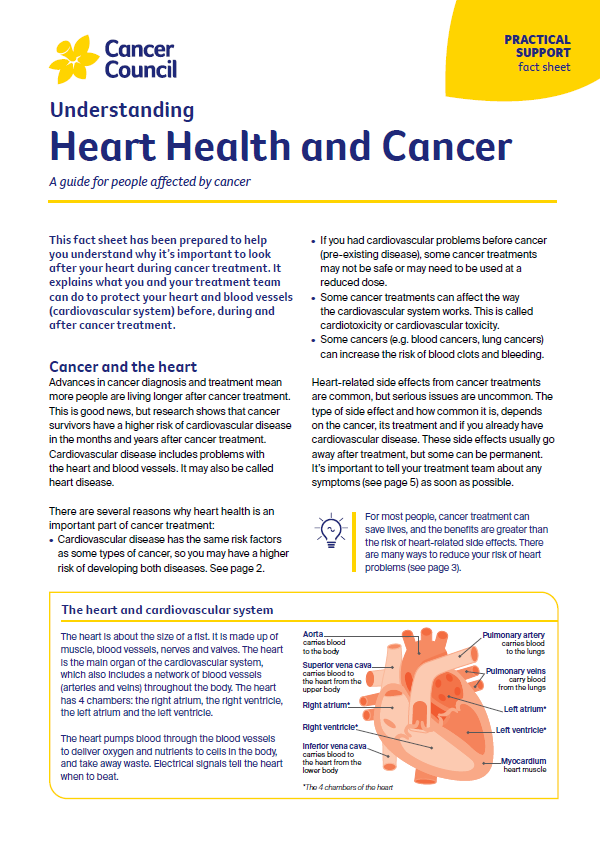- Home
- About Cancer
- Managing side effects
- Heart health and cancer
- Ways to keep your heart healthy
Ways to keep your heart healthy
Changing some daily habits can help to improve your heart health. Starting healthier habits before cancer treatment (prehabilitation) and continuing them during and after treatment (rehabilitation), may help your recovery. Some changes can also help to prevent the cancer coming back.
If your general practitioner (GP) refers you to see an allied health professional (e.g. exercise physiologist, dietitian), you may be eligible for Medicare rebates for some visits.
Sit less and be physically activeSpending too much time sitting can increase your risk of heart problems. Including regular movement and exercise in your daily or weekly routine is one of the most important changes you can make to lower your heart disease risk. It can also reduce cancer risk. It’s recommended that people with cancer work towards, then maintain, at least 150 minutes (2½ hours) of moderate-intensity aerobic exercise or 75 minutes (1¼ hours) of vigorous-intensity aerobic exercise every week. Aerobic exercise includes activities such as brisk walking or bike riding.Also, doing 2–3 strength-training (resistance exercise) sessions a week can build muscle strength. Even small increases in your activity levels can be good for your health. Learn more about exercise and cancer. | |
Quit smoking and vapingIf you smoke or vape, it’s important to quit. Exposure to tobacco smoke can cause your blood vessels to become stiff and more likely to split. This can lead to angina, heart attack or stroke. Smoking also increases the risk of developing many types of cancer. It’s also important to avoid second-hand smoke and to stop vaping (e-cigarettes), which can harm your heart as well. For support, call Quitline on 13 7848 or talk to your GP. | |
Maintain a healthy body weightCarrying extra body weight can cause fatty material to build up in your blood vessels (atherosclerosis). This increases the risk of heart problems and stroke. While some people lose weight during cancer treatment, others gain weight due to side effects of some medicines. Talk to your cancer treatment team or GP about healthy eating and staying active to help manage your weight. | |
Drink less alcoholAlcohol does not protect the heart, and drinking alcohol increases the risk of cancer. It’s important not to drink too much alcohol both for your heart health and to reduce the risk of some cancers (including breast, bowel, liver, mouth and stomach cancers). If you choose to drink, follow the Australian Government’s alcohol guidelines and limit alcohol use. If you do not drink alcohol, you should not start. | |
Eat a healthy dietEat a balanced diet from the 5 food groups – vegetables, fruit and legumes, breads and cereals, meat (and alternatives) and dairy (and alternatives). Limit foods containing saturated fat, added salt and added sugars, and avoid sugary drinks. Your doctor may suggest you see a dietitian to help you with your diet.Learn more about nutrition and cancer. | |
Take your medicineIf you take heart medicines (for blood pressure or cholesterol) or diabetes medicines, keep taking them during and after cancer treatment, unless your doctors tell you to stop. If you have questions, talk to your doctor. | |
See your GP for heart checksIt’s important to get your blood pressure, blood sugar and cholesterol checked regularly, including before, during and after cancer treatment. Talk to your GP about these tests. |
→ READ MORE: Common heart problems linked to cancer and its treatment
Prof Bogda Koczwara, Director, Australian Research Centre for Cancer Survivorship, UNSW, NSW; Prof Aaron Sverdlov, Cardiologist and Co-Director, Newcastle Centre of Excellence in Cardio-Oncology, Hunter New England Health and The University of Newcastle, NSW; Dr Diana Adams, Medical Oncologist, Macarthur Cancer Therapy Centre, NSW; Tamara Casey, Clinical Nurse Consultant, Breast Assessment Unit, Fiona Stanley Hospital, WA; Dr Daniel Chen, Cardiologist and Specialist in Cardio-Oncology, Prince of Wales and St George Hospitals, NSW; A/Prof Eng-Siew Koh, Radiation Oncologist, Liverpool Cancer Therapy Centre, Liverpool Hospital and University of NSW, NSW; Cynthia Leigh, Consumer; Dr David Mizrahi, Senior Research Fellow and Accredited Exercise Physiologist, The Daffodil Centre at Cancer Council NSW and The University of Sydney, NSW; Prof Doan Ngo, Co-Director, Newcastle Centre of Excellence in Cardio-Oncology, The University of Newcastle, Hunter Medical Research Institute, NSW; Peter O’Hearn, Consumer; Prof Nick Pavlakis, Medical Oncologist, Royal North Shore Hospital and Professor of Medicine, The University of Sydney, NSW; Deb Roffe, 13 11 20 Consultant, Cancer Council SA; Dr Lorcan Ruane, Cardiologist, The Prince Charles Hospital, QLD; Margaret Ryan, Nurse Practitioner, Cardio-Oncology Clinic, Prince of Wales Hospital, NSW; Dr Elysia Thornton-Benko, Specialist GP/Primary Care and Cancer Survivorship Physician, NSW; Helen Wardman, Consumer; Dr Trent Williams, Clinical Nurse Consultant, Cardiology, John Hunter Hospital, NSW; Dr Janice Yeh, Radiation Oncologist, Peter MacCallum Cancer Centre, VIC; Megan Yong, Consumer.
View the Cancer Council NSW editorial policy.
View all publications or call 13 11 20 for free printed copies.
